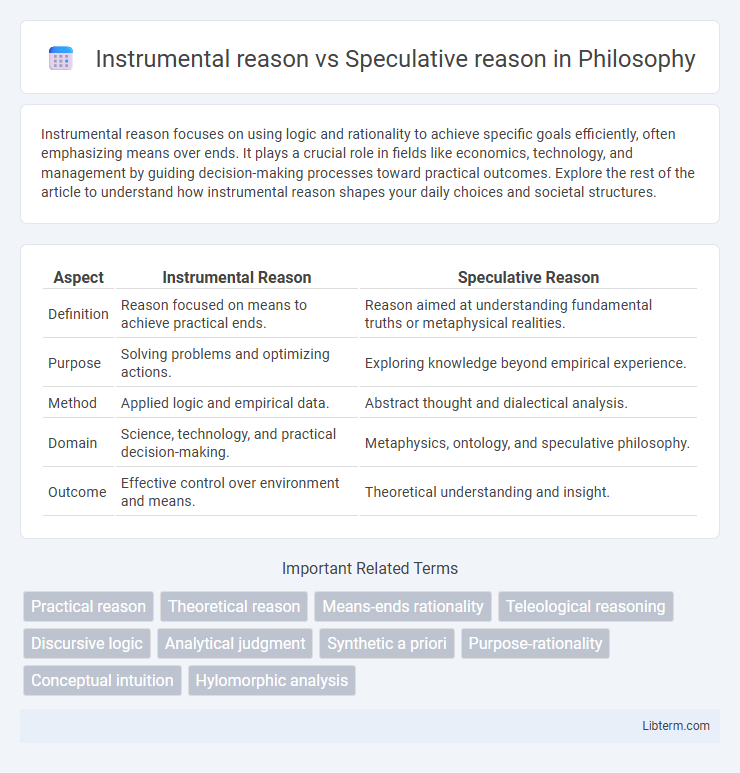Instrumental reason focuses on using logic and rationality to achieve specific goals efficiently, often emphasizing means over ends. It plays a crucial role in fields like economics, technology, and management by guiding decision-making processes toward practical outcomes. Explore the rest of the article to understand how instrumental reason shapes your daily choices and societal structures.
Table of Comparison
| Aspect | Instrumental Reason | Speculative Reason |
|---|---|---|
| Definition | Reason focused on means to achieve practical ends. | Reason aimed at understanding fundamental truths or metaphysical realities. |
| Purpose | Solving problems and optimizing actions. | Exploring knowledge beyond empirical experience. |
| Method | Applied logic and empirical data. | Abstract thought and dialectical analysis. |
| Domain | Science, technology, and practical decision-making. | Metaphysics, ontology, and speculative philosophy. |
| Outcome | Effective control over environment and means. | Theoretical understanding and insight. |
Introduction to Instrumental and Speculative Reason
Instrumental reason refers to the type of reasoning focused on finding the most efficient means to achieve specific goals or practical outcomes, often applied in technology, economics, and everyday problem-solving. Speculative reason, in contrast, seeks to understand fundamental truths and principles beyond immediate practical application, engaging in abstract theorizing and metaphysical inquiry. These two modes of reason highlight the distinction between practical efficiency and contemplative understanding in philosophical and epistemological frameworks.
Defining Instrumental Reason
Instrumental reason is the cognitive process focused on identifying the most efficient means to achieve specific goals or ends, often applied in practical decision-making and problem-solving contexts. It evaluates actions based on functionality and utility, aiming to optimize results rather than seeking inherent truths or understanding. Distinguished from speculative reason, which pursues knowledge for its own sake and contemplates abstract principles, instrumental reason prioritizes effectiveness and tangible outcomes in various fields such as economics, engineering, and management.
Understanding Speculative Reason
Speculative reason involves the pursuit of knowledge and truth for their own sake, emphasizing abstract thinking and theoretical understanding beyond practical applications. It contrasts with instrumental reason, which prioritizes efficiency and means to achieve specific goals. Understanding speculative reason enhances philosophical inquiry, encouraging deep reflection on existence, metaphysics, and epistemology without immediate concern for utility.
Historical Origins of the Distinction
The historical origins of the distinction between instrumental reason and speculative reason trace back to ancient Greek philosophy, particularly in the works of Aristotle, who differentiated practical knowledge aimed at action from theoretical knowledge seeking truth. In medieval scholasticism, this bifurcation expanded through the synthesis of Aristotelian thought and Christian theology, emphasizing speculative reason as foundational for metaphysics and instrumental reason for ethics and politics. The Enlightenment further refined this dichotomy, with Kant systematizing it by separating reason's role in empirical understanding and moral imperatives, shaping modern philosophical discourse on rationality.
Key Philosophers on Rationality
Instrumental reason, emphasized by Max Horkheimer and Theodor Adorno, prioritizes efficiency and goal-oriented thinking, often reducing human rationality to mere calculation. Speculative reason, rooted in Kantian philosophy, explores metaphysical and transcendental conditions of knowledge, highlighting critical reflection beyond practical concerns. G.W.F. Hegel's dialectical approach integrates both by viewing reason as a dynamic process developing self-awareness and freedom.
Core Differences Between Instrumental and Speculative Reason
Instrumental reason centers on practical problem-solving and efficiency, guiding actions to achieve specific, often material, goals through means-end analysis. Speculative reason pursues knowledge for its own sake, focusing on understanding fundamental truths and abstract concepts beyond immediate utility. The core difference lies in instrumental reason's goal-oriented methodology versus speculative reason's quest for theoretical insight and comprehension.
Instrumental Reason in Modern Society
Instrumental reason, emphasizing efficiency and utility, shapes decision-making processes in modern society by prioritizing means to achieve practical ends, particularly within technological and bureaucratic systems. This form of reasoning underlies economic planning, scientific methodologies, and organizational management, driving innovation and optimizing resource allocation. Its dominance influences social structures by valuing measurable outcomes over ethical or speculative considerations, often leading to a focus on control and predictability in human interactions.
The Role of Speculative Reason in Human Inquiry
Speculative reason plays a crucial role in human inquiry by enabling the exploration of abstract concepts, metaphysical principles, and theoretical ideas beyond immediate practical concerns. Unlike instrumental reason, which focuses on efficient means to achieve specific ends, speculative reason seeks to understand the fundamental nature of reality, knowledge, and existence. This form of reasoning drives philosophical reflection, scientific theorization, and intellectual creativity, fostering deeper insights and expanding the boundaries of human understanding.
Ethical Implications of Instrumental vs Speculative Reason
Instrumental reason prioritizes efficiency and utility in decision-making, often leading to ethical dilemmas when human values are subordinated to means-end calculations. Speculative reason seeks understanding and truth beyond practical outcomes, encouraging ethical reflection that respects intrinsic moral principles. The tension between these forms of reason highlights the risk of ethical compromise when instrumental rationality dominates societal or personal choices.
Conclusion: Balancing Instrumental and Speculative Rationality
Balancing instrumental and speculative rationality requires integrating practical decision-making with abstract theoretical understanding to achieve well-rounded judgment. Prioritizing instrumental reason ensures effective goal-directed actions, while speculative reason enriches the capacity for critical reflection and innovation. Harmonizing both approaches optimizes problem-solving and adapts reasoning to complex, dynamic contexts.
Instrumental reason Infographic

 libterm.com
libterm.com